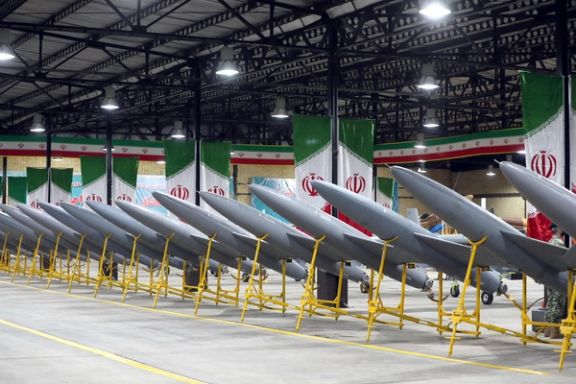Latest Company Involved In Iran’s Drone Program Revealed

Iran International has obtained information about an IRGC-affiliated company active in supplying drones and missiles for Russia and Lebanese group Hezbollah.

Iran International has obtained information about an IRGC-affiliated company active in supplying drones and missiles for Russia and Lebanese group Hezbollah.
An Iranian hacktivist group, called 'Lab-Dookhtegan' or Read My Lips, shared with Iran International exclusive information about the activities of the company, identified as ‘Tik’, sharing the photos and identities of several senior members of the company.
According to the group, the company has provided training on missile and drone production and their control systems to Hezbollah and Russian forces on several occasions this year.
The group also provided a list of the company’s senior executives, including CEO Rasul Sirati, his deputy Hamidreza Daneshi-Kohan, Kianoosh Morovatipour, the technical engineering manager of the company, Mohammad-Ali Razavi-Kohani, in charge of the assembly line and Heshmat Parsaifard, responsible for training Hezbollah forces.
The names of the cover companies used by the IRGC to evade sanctions are being revealed gradually, creating a crisis for the Islamic Republic.

Earlier in June, the Israeli research center ALMA identified the Iranian scientists behind the Shahed 136 drones used by Russia in its war on Ukraine. A report exclusively obtained by i24NEWS identified two civilian companies in Tehran that manufacture components for the Shahed drones and are reportedly operated by the IRGC.
The company Shakad Sanat Asmari, also called Chekad Sanat Faraz Asia, manufactures parts for the Iranian aviation industry and its former CEO Ehsan Rahat Varnosfadrani is the company's chief scientist. Daria Fanavar Borhan Sharif (Sadid Sazeh Parvaz Sharif) is the other company, specializing in communication, optical, and electronic circuits, and Ehsan Imaninejad is its CEO.
Pundit Jaber Rajabi told Iran International that the main reasons that Russia is using Iranian-made drones are their cheap prices and the fact that Moscow wants to have an accomplice in its invasion.
He said the Islamic Republic has spent three decades developing its military technology but since it cannot manufacture airplanes and jets, it has to focus its energy and assets on missiles and drones.
Political analyst Mehdi Mahdavi-Azad told Iran International that the issue of Iran’s drones and missiles had not been very grave for the West until Russia started to use them. He believes that before the Russian invasion, Europe and the United States were not seriously concerned about the Iranian missiles because their range is not more than 2,000 kilometers, therefore not reaching Europe's borders.
Mahdavi-Azad said the regime cunningly has not worked on long-range missiles to avoid worries by the Europeans. However, Reuters reported on Wednesday that European diplomats have told Iran they plan to retain EU ballistic missile sanctions set to expire in October under the defunct 2015 Iran nuclear deal, a step that would provoke Iranian retaliation.
Only hours after the report was released, Alireza Sabahifard, the commander of Air Defense Force of Artesh, Iran's traditional Army, said, “This year, the production of advanced long-range radar, missile and drone systems is on the agenda of the Air Defense Forces of the Army.”
Iran’s supply of drones to Russia for use in its war on Ukraine has been condemned by the US and its NATO allies and met with sanctions by the US, European Union and other states.
In April, the US Treasury Department imposed sanctions on a procurement network, which consisted of Iran’s Pardazan System Namad Arman (PASNA) and the entity's front companies and suppliers in Iran, Malaysia, Hong Kong and China that Washington said have enabled PASNA's procurement of goods and technology.
In March, Treasury’s Office of Foreign Assets Control coordinated with the FBI to designate four other firms – including the Iran-based Defense Technology and Science Research Center and its procurement firm Farazan Industrial Engineering Inc -- and three people in Iran and Turkey for allegedly buying equipment, including European-made engines, to be used for the regime’s drone and weapons programs.